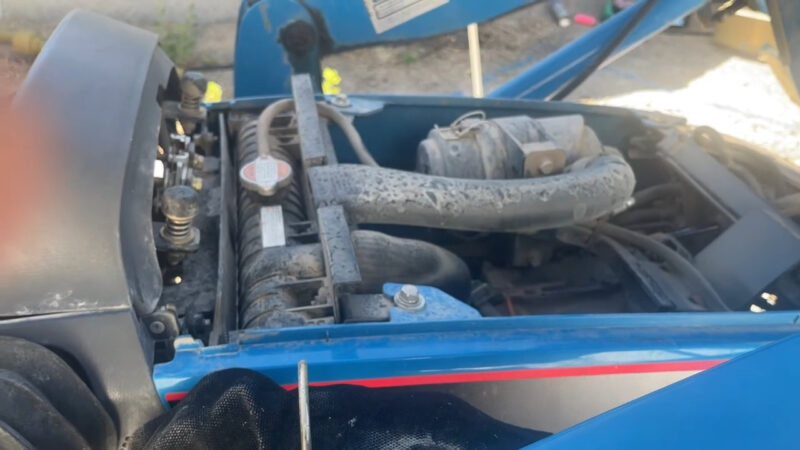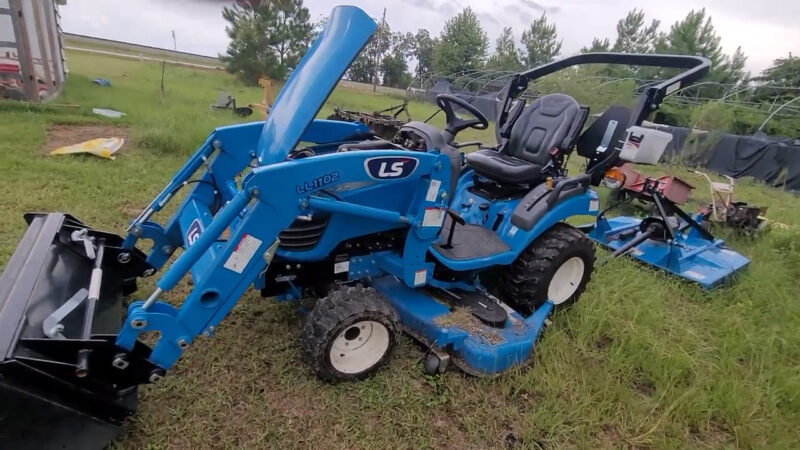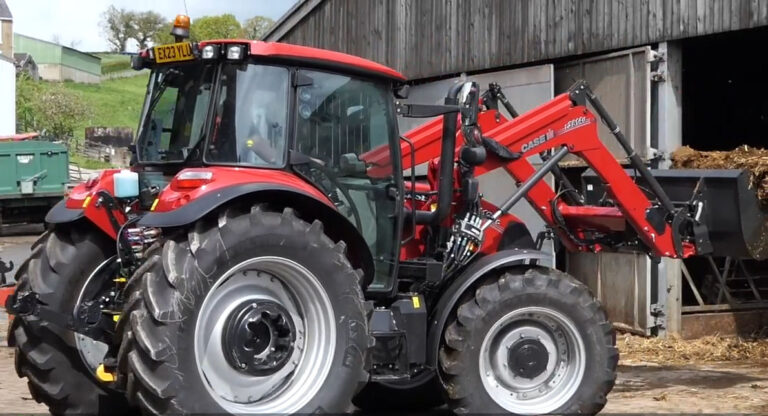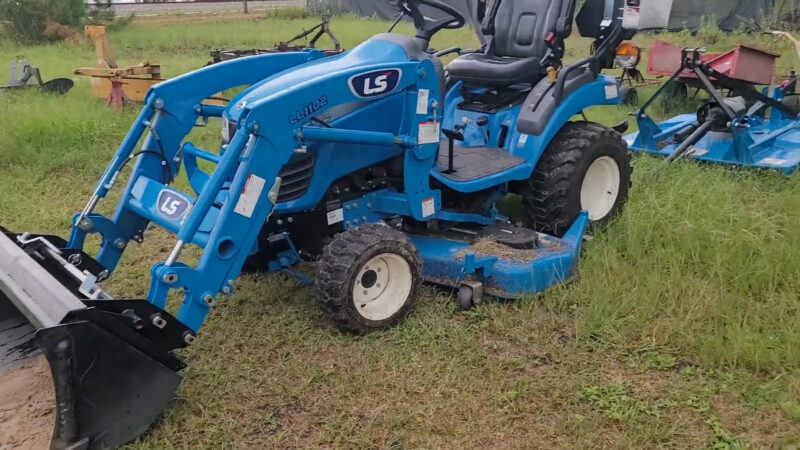The LS MT125 tractor is a compact, economical, and reliable machine, perfect for small farms and versatile enough for a variety of tasks. However, like any piece of machinery, it isn’t immune to occasional issues.
Knowing the most frequent problems and their practical solutions can help ensure the tractor stays in excellent working order.
Here are common issues with the LS MT125 tractor and straightforward ways to resolve them for smooth and efficient operation.
Problem #1: Engine Starting Difficulties
Engine starting issues are among the most common challenges faced by LS MT125 tractor owners.
These problems can significantly disrupt operations, especially during busy farming periods when every minute counts.
A tractor that refuses to start despite cranking can cause delays and lead to frustration.
Identifying the root cause is key to resolving the issue and ensuring smooth operation.
Symptoms
The engine may fail to turn over or start despite audible cranking noises.
In some cases, the cranking may be weak or intermittent, pointing to deeper mechanical or electrical issues.
Causes
Several factors can contribute to this problem:
- A discharged or old battery often lacks the power needed to start the engine. Over time, batteries lose their ability to hold a charge, especially in colder weather or after prolonged inactivity.
- Faulty wiring or loose connections in the electrical system can disrupt the power flow, preventing the engine from starting.
- Clogged fuel filters, air trapped in the fuel system, or the use of poor-quality fuel can obstruct fuel delivery to the engine, making it difficult to start.
Solutions
- Begin by checking the battery’s charge level. If the battery is low or failing to hold a charge, recharge it fully or replace it with a new one.
- Ensure all wiring and terminals are tightly connected and free from corrosion. Loose connections can often be remedied with a simple tightening.
- If fuel delivery is suspected to be the issue, inspect the fuel lines and filters for clogs. Replace dirty filters and bleed air from the fuel system to restore proper flow.
Problem #2: Engine Stalling
Engine stalling is a frustrating issue that can bring productivity to a halt.
When a tractor suddenly stops during operation, it not only disrupts workflow but can also damage equipment if left unresolved.
Engine stalling often points to underlying mechanical or fuel-related issues that require immediate attention.
Symptoms
The tractor may operate smoothly at first but then unexpectedly shut off. In some cases, stalling may occur repeatedly under heavy load or during prolonged operation, making it challenging to complete tasks efficiently.
Causes
Several factors can lead to engine stalling:
- A lack of fuel or the use of low-quality lubricants can force the engine to shut down as it struggles to maintain performance.
- Faulty Fuel Nozzles responsible for delivering the right amount of fuel to the engine, can malfunction over time, leading to inconsistent fuel flow.
- When valve gaps are improperly adjusted, the engine’s internal timing can be thrown off, resulting in erratic operation and eventual stalling.
Solutions
- Always check fuel levels before starting operations, and refill the tank with fuel that meets the recommended specifications.
- Examine the fuel nozzles for damage or blockages. Cleaning or replacing faulty nozzles can restore proper fuel delivery and prevent further stalling issues.
- Valve gaps should be inspected and adjusted according to the tractor’s specifications.
Problem #3: Overheating

Engine overheating is a serious issue that can lead to long-term damage if not addressed promptly.
The LS MT125 tractor, like all machinery, relies on an efficient cooling system to regulate engine temperature during operation.
Overheating not only compromises performance but can also damage critical components, leading to costly repairs.
Recognizing the symptoms and understanding the causes are vital to keeping the tractor in top condition.
Causes
Several factors can contribute to engine overheating:
- The coolant plays a crucial role in dissipating heat generated by the engine. Insufficient levels can cause the engine to overheat rapidly.
- Air filters prevent dust and debris from entering the engine. However, when clogged, they reduce airflow to the engine, forcing it to work harder and generate more heat.
- The fan belt drives the cooling fan, which pulls air through the radiator to regulate temperature.
Solutions
Addressing overheating requires regular inspection and proactive maintenance:
- Check the coolant levels frequently and top them up as needed with the appropriate type of coolant recommended by the manufacturer.
- A dirty radiator screen can significantly reduce airflow. Clean it regularly to ensure optimal performance. During cleaning, also inspect the radiator fins for debris and damage.
- A simple yet effective solution is to replace dirty or clogged air filters. Clean filters promote better airflow, helping the engine stay cool during intensive tasks.
- Examine the fan belt for signs of wear, cracking, or misalignment. Replace it promptly if any issues are found to ensure the cooling fan operates efficiently.
Tip: If you want to tackle common issues associated with Tym Tractors, you can find solutions here.
Problem #4: Exhaust Smoke
Excessive exhaust smoke, whether black or white, is not only a clear indicator of potential mechanical issues but can also signal inefficiencies that may affect the overall performance of your LS MT125 tractor.
While occasional smoke is normal, continuous or heavy emissions should never be ignored, as they point to underlying problems that can worsen over time if left unaddressed.
Symptoms
Black smoke indicates incomplete combustion due to a high fuel-to-air ratio or obstruction in the air intake system.
On the other hand, white smoke suggests improper fuel delivery or excess oil burning in the engine, which can result in visible, dense white emissions.

Causes
Black Smoke Causes:
- Too much fuel and insufficient air in the combustion chamber create soot and lead to black smoke.
- Dirty or blocked air filters restrict airflow, further disrupting the fuel-to-air balance.
- Old fuel or impurities can also cause incomplete combustion.
White Smoke Causes:
- Blockages or malfunctions in the fuel injectors or pumps may result in incomplete fuel combustion.
- Restricted airflow may disrupt the combustion process, leading to white smoke.
- An overfilled engine or leaks can cause oil to burn along with fuel, resulting in white emissions.
Solutions
Addressing black smoke
- Inspect and clean the air filters to ensure proper airflow. If they are heavily clogged, replace them with new ones.
- Use fresh, high-quality fuel to avoid combustion inefficiencies caused by contamination or stale fuel.
- Monitor and adjust the fuel-to-air ratio, especially during scheduled maintenance, to ensure optimal performance.
Resolving white smoke:
- Check the fuel system for any blockages or damages in the injectors, pumps, or lines. Repair or replace malfunctioning components as needed.
- Clean or replace the air cleaner to improve airflow.
- Examine oil levels and drain any excess to prevent oil from entering the combustion chamber. Repair leaks promptly to avoid future issues.
Problem #5: Steering and Hydraulic Issues
Steering and hydraulic problems can significantly impact the LS MT125 tractor’s maneuverability and overall performance, making it difficult to handle tasks efficiently.
These issues may manifest as difficulty in steering, unexpected stiffness, unusual noises, or a noticeable decline in hydraulic response.
Left unaddressed, they can lead to operational delays and potential damage to the tractor’s hydraulic system, steering mechanism, or both.
Symptoms
Steering becomes stiff or unresponsive during operation.
Unusual noises, such as whining or hissing, are heard while steering or engaging in hydraulic functions.
Hydraulic components, such as the loader or lift arms, fail to operate smoothly or lose power intermittently.
Causes
Misaligned bolts or worn-out steering components can cause instability or make steering difficult.
A faulty hydraulic pump can fail to deliver adequate pressure for smooth operation.
Air trapped in the hydraulic system disrupts fluid flow, leading to reduced efficiency.
Improper or insufficient hydraulic oil levels can result in overheating, noise, or poor hydraulic response.
Solutions
How about solutions?
Addressing Mechanical Causes
Inspect the steering components for any signs of wear or misalignment. Tighten bolts or replace damaged parts to restore stability.
If the hydraulic pump is identified as faulty, replace it with a compatible and high-quality component to ensure optimal pressure delivery.
Resolving Hydraulic System Problems
Begin by checking the hydraulic oil level. Refill it to the manufacturer’s recommended level using the appropriate grade of oil.
Bleed the system to remove any trapped air, ensuring a consistent fluid flow.
The process involves opening the hydraulic system’s bleed valves and cycling the hydraulic functions until air bubbles are eliminated.
These hydraulic system issues are commonly found in Case IH Farmall Tractors as well.
The Bottom Line
The LS MT125 is a dependable tractor when properly maintained. Regular upkeep, such as using quality fuel, lubricants, and consumables, can prevent most issues.
While many problems can be solved with basic troubleshooting, seek professional assistance for persistent or complex concerns to ensure your tractor continues to perform at its best.
Related Posts:
- 7 Common Problems with Tym Tractor and Troubleshooting
- 5 Most Common Problems with Case IH Farmall Tractors
- Can Gallstones Cause Fatigue And Dizziness?…
- How Organic Food Can Prevent Common Oral Health Issues
- What Causes White Spots on Cucumber Leaves and How…
- 10 Key Nutrient Deficiencies in Plants and How to…









